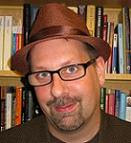First of all, I'm not fond of the term. But when journalist Rod Dreher first wrote about "crunchy conservatives" -- or the more clever "Birkenstocked Burkeans" -- back in 2002, I appreciated his article so much I sent off an email straight away congratulating him on it. Later, I used that original article in this blog as a jumping-off point for talking about and attempting to understand my own sociopolitical beliefs and attitudes (permalinked in the righthand column as "Straight, No Chaser: Who's Dave?").
Now Dreher has fleshed out his ideas in a new full-length book that I happened across while at a Borders in San Diego. Without having read it yet, I'd wager that its longwinded, ridiculous title, Crunchy Cons: How Birkenstocked Burkeans, gun-loving organic gardeners, evangelical free-range farmers, hip homeschooling mamas, right-wing nature lovers, and their diverse tribe of countercultrual conservatives plan to save America (or at least the Republican Party), belies the timely and worthy questions it raises not just about political alignments but also about the larger questions of living a spiritually satisfying life in the relentless face of soul-deadening modernity.
Indeed, I'd guess the book's absurd subtitle was written, or at least heavily influenced by, marketing dorks at Random House because my understanding is that Dreher, like Russell Kirk before him, is attempting to define a particular sensibility, not offer a political program to "save" America, Republicans, the universe, or whatever. That kind of thinking is generally antithetical to what's understood as the conversative tradition.
What's Old Is New Again
Anyway, what is a crunchy conservative? Again in the vein of Kirk, who in his seminal work The Conservative Mind, identified and described six canons (later expanded to 10 principles) of conservative thought, Dreher posits a nine-point manifesto as follows:
- We are conservatives who stand outside the conservative mainstream; therefore, we can see things that matter more clearly.
- Modern conservatism has become too focused on money, power, and the accumulation of stuff, and insufficiently concerned with the content of our individual and social character.
- Big business deserves as much skepticism as big government.
- Culture is more important than politics and economics.
- A conservatism that does not practice restraint, humility, and good stewardship—especially of the natural world—is not fundamentally conservative.
- Small, Local, Old, and Particular are almost always better than Big, Global, New, and Abstract.
- Beauty is more important than efficiency.
- The relentlessness of media-driven pop culture deadens our senses to authentic truth, beauty, and wisdom.
- We share Russell Kirk's conviction that "the institution most essential to conserve is the family."
Crunchy Con-troversy
National Review Online has set up a blog for Dreher, its editors, and others to debate and discuss the book. Already, Jonah Goldberg is stamping his foot and saying the sensibility Dreher is trying to identify and describe doesn't actually exist because... well, I don't know, because it would be at odds with contemporary Republican politics, Bushian policy, and the National Review party line. That's what his objections sound like to me, anyway.
Thanks, Jonah, but I'll make up my own mind. In the meantime, here's a review of the book on OpinionJournal.com by George Nash, an astute gentleman I was fortunate enough to once meet and talk with about his book, The Conservative Intellectual Movement in America Since 1945. I'll post my own impressions once I have a chance to read Dreher's opus.
Update 3/2: Jonah Goldberg has posted a (much) longer version of his objections, including his wish to read Rod Dreher out of the conservative movement.











|